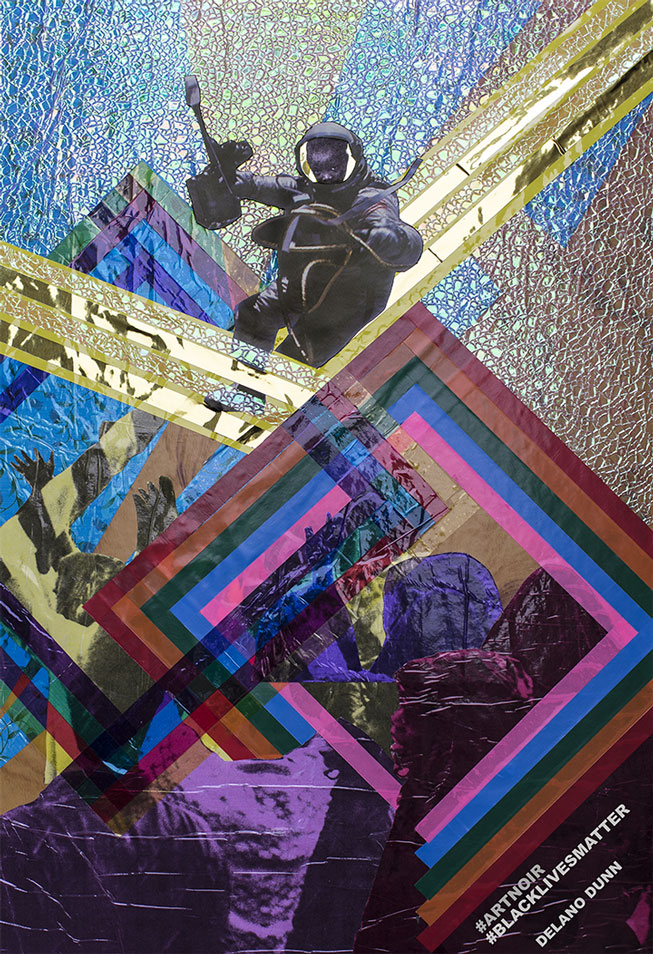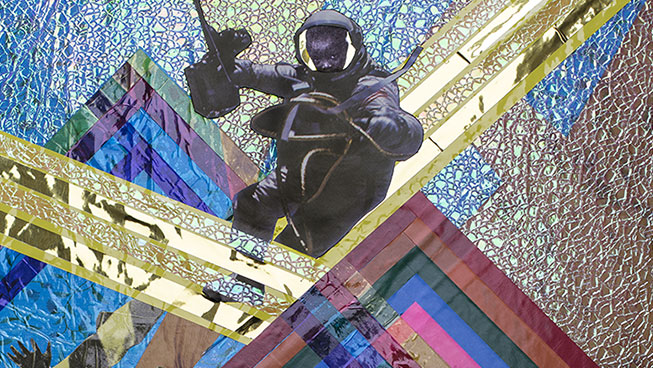
“Revolution” by Delano Dunn
By Barbara Ransbury
Revolution! The word means different things to different people. It has been made seductive by the work of artists like Lin-Manuel Miranda, in his groundbreaking musical, Hamilton. Perhaps a more palatable “call for revolution” is Bernie Sanders’ new organization, Our Revolution, which asks Americans to “reclaim democracy for the working people of our country by harnessing the transformative energy of the ‘political revolution.’”
Invocations of revolution have long held a special place in the radical imagination of Black freedom struggles all over the world.
When I was a teenager growing up in Detroit in the 1960s and 70s, I thought we were on the verge, if not in the midst, of a revolution. Increasingly, I have come to view revolution as a process, not an event, as a journey, not a final destination. In fact, there is no ‘promised land’ in my revolutionary imagination, just a beautiful eternal promise that we make to one another (and to the planet) to fight with unrelenting passion for a more just, humane and sustainable world.
Revolution begins with a dream.
The young people in the Movement for Black Lives understand this. I have been privileged to come to know many of these young people over the past few years, and I have witnessed firsthand how they are waging this struggle for their generation.
Revolution begins with a dream. It begins in our individual and collective imaginations. We must be able to look out at what we can already see and do the impossible – imagine something we have not yet seen.
To paraphrase the incomparable Nina Simone, we must close our eyes and ask ourselves: how would it feel to be free? And then we must open our eyes and say: what price would we pay for that collective freedom?
The price for some of us might be to live with less, so that others can have enough. The blunt truth is that when we curtail the billionaire class’s ability to exploit the system – pillaging and stealing from the rest of us – we all live much better and freer.
When we can implement truly democratic decision making, rather than settling for politics as circus performance, we move farther down the freedom road. And when we own up to the bloody legacy of chattel slavery and genocide, as a nation, we create possibilities for revolutionary change – change for everyone. But it has to begin with those who have been the most marginalized and disenfranchised.
Revolution is the struggle to make freedom possible.
Revolution is the struggle to make freedom possible, and revolutionary struggle – the process through which we transform ourselves and our world – must be mindful of ill-conceived and ill-fated “revolutions.” Many of us were inspired by the massive 2011 occupation of Tahrir Square in Egypt, the “January 25 Revolution” that ousted the corrupt Hosni Mubarak, only to see him replaced by an even more repressive military elite.
We can bask in our delicious freedom dreams, the big collective ones, all day long. But dreaming is only the beginning, only one part of “getting free.” We must also fight. This begins with a discerning analysis of the regimes of power we now live under. These are multiple and interrelated: racial capitalism and the neoliberal state that makes the function of racial capitalism possible in the 21st century; heteropatriarchy that “normalizes” hierarchy, violence, coercion and the “unloving of ourselves” in the most intimate places of our lives; and white supremacy, which cleaves the world and history into the deserving and undeserving, the civilized rulers and the uncivilized to be colonized and contained. Revolution is the daunting and exciting invitation to dislodge and dismantle all of these entrenched structures of domination and to not only imagine, but to build something better.
To say revolution is a process that begins with dreaming is not to say people should settle for modest reforms and a stagnant state of ongoing “unfreedom.” Rather those interested in fundamental systemic change have to think soberly about the concrete, disciplined, gritty and glorious work of revolution making. While I recognize the enormous importance of local grassroots, community-based organizing, I think this moment, both perilous and promising, demands that we embark on new national debates, and combine forces to build new national organizations.
It has been 40 years since Dr. King’s famous “A Radical Revolution of Values” speech, delivered in New York’s Riverside Church, where he declared his opposition to the war in Vietnam on April 4, 1967. He was assassinated exactly one year later. His words are as poignant in 2017 as they were in 1967: “We as a nation must undergo a radical revolution of values. We must rapidly begin … the shift from a thing-oriented society to a person-oriented society. When machines and computers, profit motives and property rights, are considered more important than people, the giant triplets of racism, extreme materialism and militarism are incapable of being conquered.”
And with those words, he lays out our challenge. Will we accept it?
In addition to the March 8th Women’s strike, which I hope everyone will support, there will be a national day of teaching and learning about resistance movements on April 4, 2017, the anniversary of King’s assassination. Mark your calendars. And many of the leaders of the Movement for Black Lives, immigration justice organizers, Arab and Muslim groups, feminists and LGBTQIA folks will join labor organizers in massive demonstrations on May Day (May 1, 2017) this year.
Join the revolution!















